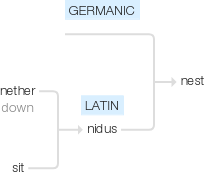Nest
Old English, of Germanic origin; related to Latin nidus, from the Indo-European bases of nether (meaning ‘down’) and sit.
wiktionary
From Middle English nest, nist, nyst, from Old English nest, from Proto-West Germanic *nest, from Proto-Germanic *nestą, from Proto-Indo-European *nisdós(“nest”), literally "where [the bird] sits down", a compound of *ni(“down”) (whence also English nether) + the zero-grade of the root *sed-(“to sit”) (whence also English sit).
From Middle English nesten, nisten, from Old English nistan, nistian, from Proto-West Germanic *nistijan(“to nest, build a nest”). Cognate with Saterland Frisian näästje(“to nest”), Dutch nesten(“to nest”), German Low German nüsten(“to nest”), German nisten(“to nest”).
etymonline
nest (n.)
"structure built by a bird or domestic fowl for the insulation and rearing of its young," Old English nest "bird's nest; snug retreat," also "young bird, brood," from Proto-Germanic *nistaz (source also of Middle Low German, Middle Dutch nest, German Nest; not found in Scandinavian or Gothic), from PIE *nizdo- (source also of Sanskrit nidah "resting place, nest," Latin nidus "nest," Old Church Slavonic gnezdo, Old Irish net, Welsh nyth, Breton nez "nest"), probably from *ni "down" + from PIE root *sed- (1) "to sit."
From c. 1200 of an animal or insect. Used since Middle English in reference to various accumulations of things, especially of diminishing sizes, each fitting within the next (such as a nest of drawers, early 18c.). Nest egg "retirement savings" is from 1700; it was originally "a real or artificial egg left in a nest to induce the hen to go on laying there" (nest ei, early 14c.), hence "something laid up as the beginning of a continued growth."
nest (v.)
Middle English nesten, from Old English nistan "to build (a bird's) nests, to make or live in a nest," from Proto-Germanic *nistijanan, from the source of nest (n.). The modern verb is perhaps a new formation in Middle English from the noun. Related: Nested; nesting.
